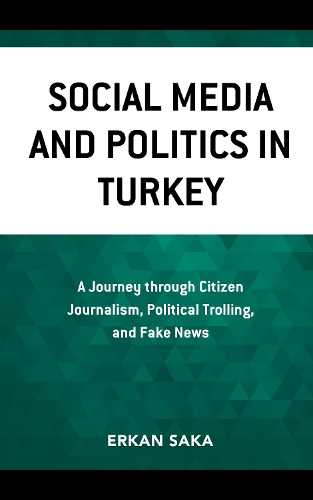
Social Media and Politics in Turkey: A Journey through Citizen Journalism, Political Trolling, and Fake News
(Hardback)
Available Formats
Publishing Details
Social Media and Politics in Turkey: A Journey through Citizen Journalism, Political Trolling, and Fake News
By (Author) Erkan Saka
Bloomsbury Publishing PLC
Lexington Books
20th November 2019
United States
Classifications
Professional and Scholarly
Non Fiction
306.209561
Physical Properties
Hardback
140
Width 161mm, Height 233mm, Spine 18mm
390g
Description
This book focuses on media and zeroes in some critical and oppositional aspects of internet usage within Turkey. It does not radically challenge some works on Turkeys recent grand narrative but presents empirical and minor accounts to this. However, in elaborating the long history of relatively resilient and multilayered oppositional digital media networks in Turkey, this book insists that an idea of authoritarian turn may be misleading as the internet communications are exposed to repressive measures and surveillance tactics from the very beginning of the countrys recent past. While discussing from citizen journalism practices to political trolls and from Gezi Park protests to disinformation campaigns, this book pays tribute to digital activists and points out that mobilizing through digital networks can present glimmers of hope in challenging authoritarian regimes.
Reviews
A great study of Turkish media cutting across political science, media studies and journalism. Saka's analysis is revolutionary it its inclusion of all aspects relating to social media use politically in Turkey. It is fresh, insightful, well-research and surprisingly up-to-date in an area that keeps changing by the minute. The research is careful, sound, informed, concise and very much relevant to both the scholar and the everyday reader. A fresh look at Turkish media and politics that is on a solid path to be an instant classic. -- Murat Akser, Lecturer, University of Ulster
Organized around the seminal 'Occupy Gezi Park' events of 2013 and their aftermath, this meticulous account of the emergence of internet citizen journalism in Turkey by one of its pioneering figures ends with chapters on his courageous, remarkable ethnographic research on the emergence of pro-government trolls. The resulting mischief of 'fake news' appears depressingly in Turkey as elsewhere as the state has developed its own internet strategy. As an anitdote, Saka returns in his conclusion to the deeper tradition of online journalism that he chronicles to find not only hope, but inventive ideas and practices to counter the infestation of trolls. This is a meticulous, brilliantly explored work of committed ethnographic scholarship. -- George E. Marcus, University of California, Irvine
Author Bio
Erkan Saka is associate professor of media and journalism studies at Bilgi University.
